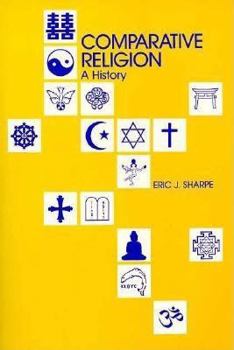Comparative Religion: A History
Select Format
Select Condition 
Book Overview
This book is now firmly established as the standard treatment of its subject. The history of comparative religion is traced in detail from its beginnings in the nineteenth century, in the work of... This description may be from another edition of this product.
Format:Paperback
Language:English
ISBN:0812690419
ISBN13:9780812690415
Release Date:March 1999
Publisher:Open Court
Length:341 Pages
Weight:1.30 lbs.
Dimensions:1.0" x 6.0" x 9.0"
Customer Reviews
2 ratings
a superb book
Published by Thriftbooks.com User , 16 years ago
Sharpe is remarkable for his breath of knowledge -- his footnotes and references are in a half dozen or more languages -- and he writes clearly and interestingly. This is not only a very fine introduction to the development of comparative religion, but one sees in the background the development of modern thought more generally. The 19th century belief in the science of this and that -- anthropology was "the science of man," comparative religion was "the science of religion," and so forth. And they saw, not just biology, but everything through the lense of evolution. As he writes, evolution became not just a theory but a mind-set. Hence, the meaning of religion was sought in its origins and it was assumed to go through a sequence of upward phases, just as the meaning of government was sought in its origin and stages and so for other fields. Then there is a period in which psychology and subjective experience become central -- in a reductionist and unlearned way in Freud, in a high minded way in Otto's Idea of the Holy. These are turns in the culture at large that are reflected in how people try to understand religion and religious phenomena. Sharpe is himself an open-minded and sensitive student of religion, and brings an honest, respectful tone to his narrative. I was sad to learn that he died a few years ago. I have read one other of his books -- he left an excellent legacy behind.
Magisterial and judicious.
Published by Thriftbooks.com User , 16 years ago
This is one of those books that, the more you know about the subject coming in, the more you learn. I had read or at least recognized a large enough minority of the figures Sharpe describes so that all the new names didn't quite overwhelm me. (It would help if he wouldn't assume his readers know all the European languages, though -- how would he like having Japanese and Chinese thrown at him in important footnotes and even the text?) In some ways, this is a very straight-forward history of comparative religion. Sharpe begins with a few ancients, a few missionaries, and Enlightenment precursors, then plunges into early theories about fetishes, totems, animism, and the "evolution of religions" schools of the late 19th Century. His discussion of The Golden Bough, of Fraser, and all the rest of that era, is excellent. I also appreciate his fair and judicious take on Andrew Lang and the "high god" phenomena -- which confuses a lot of moderns. [...]. He takes a chapter out to describe the early psychology of religions school, centered around James and a few other Americans. In later chapters, Sharpe veers off to discuss Freud's zany horror-flick theory of the origins of religion, and (with deservedly more respect) Jung's interest in and influence on comparative religion. He talks a bit about structuralism, diffusion of cultures, and more about phenomenology. In each case, he tells the history of the movement -- and almost always offers reasonable and temperate evaluations. He has, perhaps, learned from John Farquhar, because in some ways his approach is very like Farquhar's in The Crown of Hinduism -- he finds something of value even in conflicting takes on religion. Sharpe knew the subject deeply. I am sure I will find this book invaluable as I continue a research project I am conducting on the relationship between Chinese philosophy and Christianity. I do have a few criticisms. Like many autobiographies, the book sort of dies towards the end, spreading out like a river into its delta. His description of the Tokyo conference is confusing -- who said what, exactly? I disagree with Sharpe's view that the Bible uniformly views other religions as "the work of fallen angels or other evil spirits;" and am developing a response to that view. I also missed a few names. Where was James Legge, the single greatest Western sinologist of all times? In general, Sharpe was weak on East Asia -- he plays to his strength usually, which was India. And where were Girard or Stark? Maybe they were just acquiring fame when Sharpe wrote this book -- discussion of their ideas would have been more interesting than the in-house politics that Sharpe ends with. All in all, though, I strongly recommend this book. Sharpe is sympathetic, kind, and wise, and I'm sure this magisterial treatment will be of help to people in many different fields.





